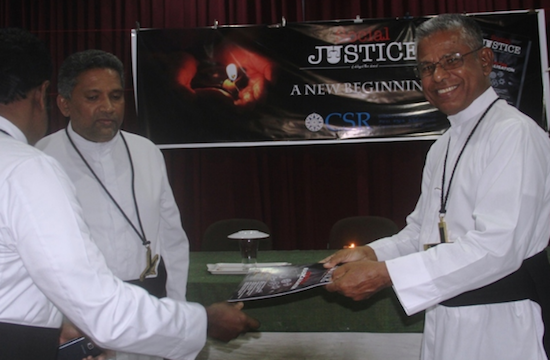Sri Lankan Oblates Relaunch Pro-democracy Magazine
‘Social Justice’ aims to raise awareness of burning issues as tsunami of religious violence washes over island
Pictured left: Father Rohan Silva, chairman of the Center for Society and Religion (CSR), hands a copy of Social Justice magazine to the provincial oblate (second from left) at the CSR headquarters in Colombo on July 4. (Photo by Niranjani Roland/ucanews.com).
Oblate priests in Sri Lanka have relaunched a magazine called Social Justice to promote democracy, justice, ethnic harmony and equality some 16 years after it went out of print.
It was put back into print this month with the rollout edition themed along the lines of “Religious extremism and radicalization.”
“Social Justice has never been a collection of lullabies, platitudes and stereotypes that lulled people to sleep,” said Father Rohan Silva, chairman of the Center for Society and Religion (CSR), which publishes the magazine.
“Rather, it has rather served as an alarm bell going off at unexpected moments to disturb people from their slumber,” he told social activists, priests and nuns at a launch event in Colombo on July 4.
Dr. Harini Amarasooriya, a social anthropologist and senior lecturer at the Open University of Sri Lanka, said the issues the magazine is promoting could have been put back in the public eye at a more opportune time.
“In the context of the struggles the country is now going through, its relaunch is very important,” she said. “The magazine reminds us there are structural institutions creating insecurity in our society. It served as a huge inspiration in its glory days and we need that now more than ever. Today religion is becoming associated with some very ugly incidents. Social Justice shows how even religion can be exploited to serve evil purposes.”
Father Silva said the magazine has a crucial role to play in raising awareness of issues that continue to plague Sri Lankan society.
“Social Justice has had the courage to be outspoken in matters related to the country’s social, political, economic and cultural realities,” added the priest, who formerly headed the Missionary Oblates of Mary Immaculate congregation for Sri Lanka, Bangladesh, Pakistan and Japan. “We must make every possible effort to promote democracy here.”
The magazine went out of print in 2002 at a time when Sri Lanka was still in the middle of a bloody 26-year civil war, which finally ended in 2009 when the military squashed all resistance from the Tamil Tigers.
However, this Buddhist-majority island nation is still wracked with religious intolerance, notably a series of anti-Muslim riots that broke out in late February and culminated in central Kandy district in early March.
They resulted in at least two casualties, a dozen injuries and over 80 arrests as Sinhalese Buddhists attacked Muslim homes, businesses and places of worship.
The riots were sparked by news that a Sinhalese Buddhist truck driver, who had been set upon by four allegedly drunk Muslim men, had died of his injuries in hospital.
“The task of raising awareness of sensitizing people — who are quite content with the status-quo — to the problems we still face is by no means an easy or pleasant one,” Father Silva said.
The magazine was launched in 1937 by Father Peter Pillai OMI, the son of a schoolmaster and the youngest of five brothers born to a devoutly Catholic family. He later studied at Cambridge and University College London.
Father Pillai was ordained the priesthood in Rome at the age of 30, founded the Catholic School Guild in 1936 and established the magazine shortly afterwards to advocate social justice and champion the rights of the working class.
Control of Social Justice was transferred to Father Tissa Balasuriya OMI in 1987, and Father Oswald B. Firth OMI and Richard Dias served as its editors from 1996-2002 when financial constraints led to its demise.
Father Ashok Stephen, executive director of CSR, said politicians are bending people’s faith to serve their personal agendas and mobilizing religion for political gain.
“All religions in Sri Lanka, indeed globally, are beginning to adopt or show signs of militant behavior and aggression,” he said in a release promoting the June-July edition.
ShanthiKumar Hettiararachchi, the new editor-in-chief of Social Justice, said its fundamental goal was to help Sri Lanka become a fairer and more democratic society by respecting the roles all its members play.
“We are basically doing the same thing we did before, just upgraded to a contemporary setting and the complex socio-economic issues we are grappling with,” he said.
By Niranjani Roland
Published on the La Croix International Website


